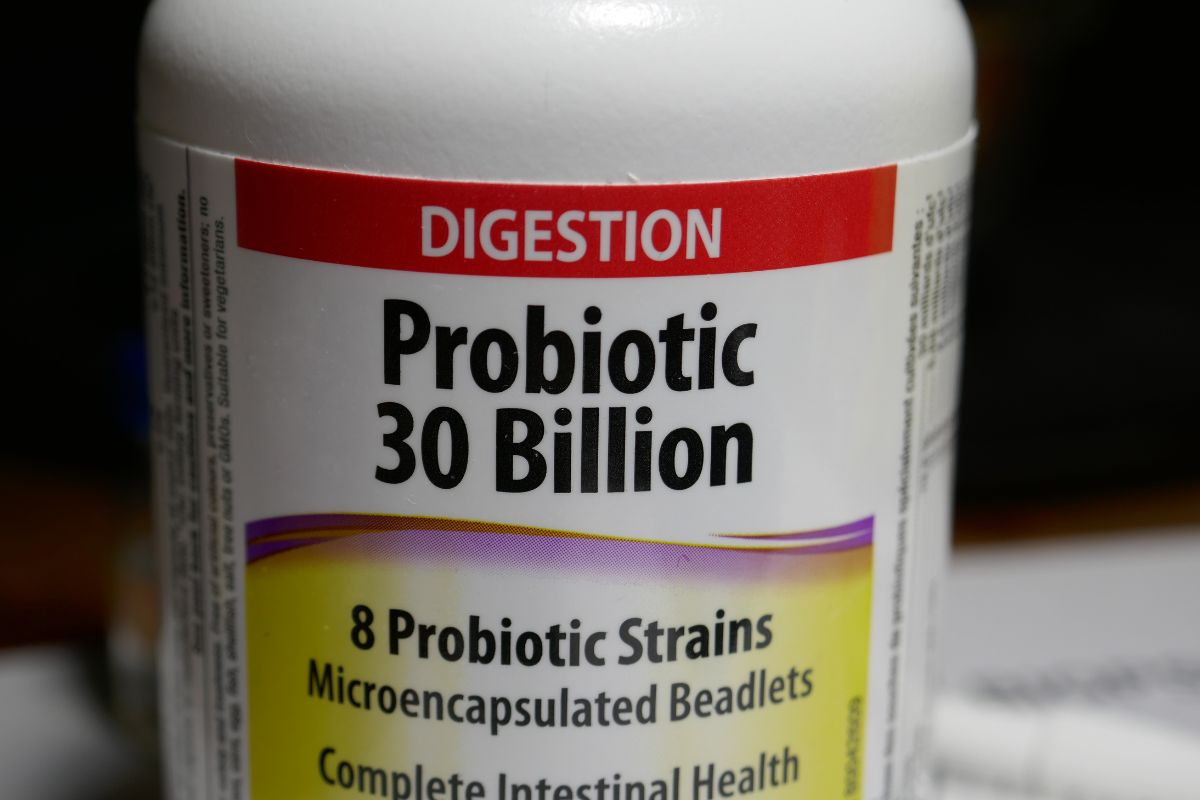Crohn’s disease is a painful, debilitating, and sometimes life-threatening disease that affects the digestive system. Sufferers may experience a range of symptoms, from abdominal pain and diarrhea to severe cramping and malnutrition.

Unfortunately, there’s no cure for Crohn’s disease. Instead, Crohn’s can be managed through a combination of different treatments, depending on the severity of symptoms. It’s thought that around 780,000 Americans are currently living with Crohn’s.
In an attempt to manage their symptoms, Crohn’s sufferers may try a range of different prescribed and unprescribed treatments – one of which is probiotics.
Many people living with Crohn’s claim that probiotics can help reduce the severity of symptoms and flares and make daily life more manageable.
Is there any evidence to support the effectiveness of probiotics as a treatment for Crohn’s, and how exactly would they work in the digestive tract?
What Is Crohn’s Disease?
Crohn’s disease is a type of inflammatory bowel disease that causes parts of the digestive system to become inflamed. This inflammation can lead to symptoms such as abdominal pain, diarrhea, fatigue, weight loss, and malnutrition.
Crohn’s disease is considered a chronic illness. There’s currently no cure for Crohn’s disease, but effective treatment can help reduce the severity of symptoms and prevent the need for surgery further down the line.
People living with Crohn’s disease may also be at an increased risk of developing gallstones, fever, liver disease, and kidney stones.
Crohn’s disease is a debilitating and painful condition for sufferers. In some cases, it can lead to life-threatening complications. Symptoms can range from mild to severe, but they usually develop gradually.
In some cases, symptoms can appear suddenly and painfully. People living with Crohn’s may also go through periods of remission, where they have no signs or symptoms of the condition.
How Is Crohn’s Disease Treated?
Because there’s currently no cure for Crohn’s disease, most people will require consistent treatment to manage their symptoms.
If you have Crohn’s, you’ll usually have a team of medical professionals to help you with your treatment. The most common treatments for Crohn’s disease are:
- Surgery to remove a portion of the digestive system
- Medicines such as injections or tablets to prevent inflammation from returning
- Medicines to reduce the level of inflammation in your digestive system
Finding the right treatment for you may be a process of trial and error. All people living with Crohn’s respond differently to treatment, so what’s right for one patient may not be right for another.
The efficacy of treatment will depend on how severe your symptoms are and how your body reacts to medication or surgery.
Unfortunately, medical professionals still don’t know the causes of Crohn’s disease. It’s thought that several factors may be at play, including:
- A gut bacteria imbalance
- Smoking
- Your genetics
- Problems with the immune system
- A previous stomach bug

Can Probiotics Help Crohn’s Disease?
Some people living with Crohn’s take probiotics to reduce their symptoms – but how exactly would this work?
People living with Crohn’s disease will experience a range of gastrointestinal problems, including diarrhea, abdominal pain, pain around the anus, blood in the stool, and cramping.
Because most symptoms attack or stem from the digestive tract, treatments focus on alleviating the symptoms in this area.
Probiotics are filled with good bacteria that are thought to keep the body healthy and functioning. The good bacteria found in probiotics may also fight off bad bacteria and help keep your microbiome healthy.
Probiotics specifically help aid digestion by helping to absorb more protein in the diet, lowering pH levels in the colon, and more. However, more research is needed to understand the true effects of probiotics on the digestive system.
What we do know, is that most probiotics are different lactobacillus and bifidobacterium strains, including l.casei, l.plantarum, l.acidophilus, b.lactis, b.longum, and b.bifidum.
Research into these strains of probiotics has found that they can help relieve constipation and crowd out the presence of bad bacteria in the intestine.
It’s thought that this can prevent the bad bacteria in the intestine from multiplying, which causes inflammation or infection. So, how exactly can this help Crohn’s sufferers?
While there’s not enough evidence to confirm whether or not probiotics are beneficial for Crohn’s sufferers, it’s thought that they may reduce the presence of inflammatory bacteria in the digestive tract, which could reduce some of the most debilitating symptoms of Crohn’s.
If you’re thinking of taking probiotics to reduce the symptoms of Crohn’s disease, it’s worth talking to your doctor first.
Probiotics And Crohn’s: The Risks
Although probiotics are considered safe for more people, there may be risks for people living with Crohn’s disease. The results of studies examining the benefits of probiotics in the treatment of Crohn’s are inconclusive.
To date, there are also no probiotic products that have been approved by the Food and Drug Administration (FDA), which means you could end up taking probiotics with unregulated ingredients that could worsen your symptoms.
In some immunocompromised people, probiotics may cause harmful and unwanted side effects. This could include an increased risk of infection and a transfer of antibiotic resistance genes in the digestive tract.
Although these symptoms appear to be rare, you should always talk to a medical professional before taking probiotics if you have Crohn’s.
Probiotic treatments may not be appropriate for all Crohn’s sufferers, and there’s insufficient research on the long-term effects of consistent probiotic consumption.
The Bottom Line
Crohn’s disease is a painful, chronic condition. To date, there is no cure for Crohn’s disease, and all symptoms must be managed with a range of treatments.
In addition to seeking surgery and medication, some Crohn’s sufferers may take external supplements and treatments such as probiotics to alleviate their symptoms.
Unfortunately, more research is needed to determine whether or not probiotics are an effective treatment for Crohn’s.
If you want to pursue probiotic treatment to alleviate your symptoms, always talk to a medical professional first.
Remember: although probiotics are considered to be safe, they may have undesirable effects for some users.
- Understanding Male Reproductive Health: A Complete Guide - February 2, 2025
- Simple Healthy Skin Habits for Radiant Skin - December 6, 2024
- Unlocking the Connection Between Nutrition and Mental Health - December 3, 2024








